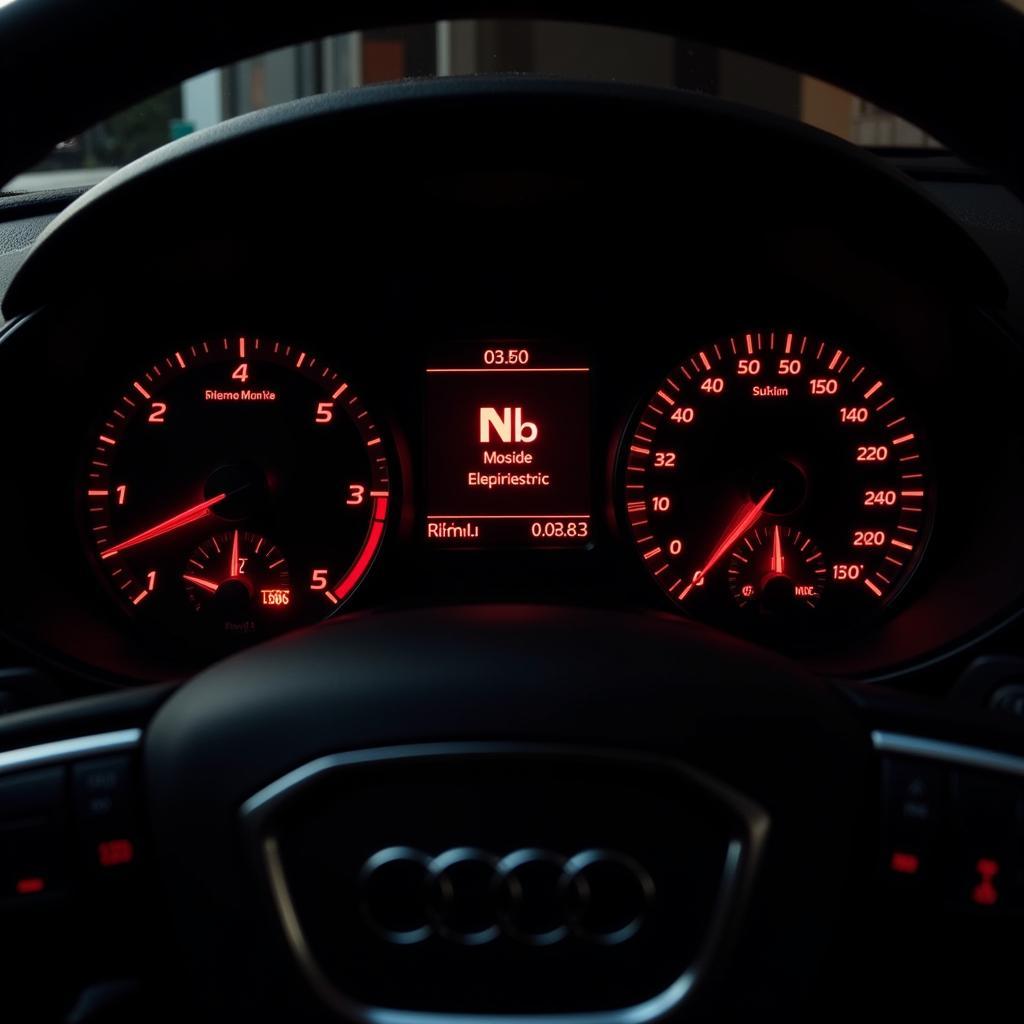Modern Audis are renowned for their sophisticated engineering and cutting-edge technology. Central to this is the intricate network of electronic systems that control nearly every aspect of the vehicle’s operation. This reliance on electronics, while enhancing performance and efficiency, necessitates a deep understanding of Audi Car Diagnostics. Whether you’re a DIY enthusiast or considering a professional mechanic, understanding the nuances of Audi car diagnostics is crucial.
 Audi Car Diagnostics Dashboard
Audi Car Diagnostics Dashboard
What are Audi Car Diagnostics?
Audi car diagnostics involve plugging a specialized tool, known as an OBD-II scanner, into your vehicle’s onboard computer. This scanner acts as a communication bridge, allowing you to access and interpret the treasure trove of data stored within the car’s various control modules. This data can range from simple information like engine RPM and coolant temperature to more complex insights into the performance of the transmission, airbags, and other critical systems.
The Importance of Regular Audi Car Diagnostics
Imagine this: you’re cruising down the highway, enjoying the signature Audi performance, when suddenly a warning light appears on your dashboard. This unexpected guest, often appearing as a cryptic symbol, can be a harbinger of anything from a minor sensor malfunction to a more serious mechanical issue. Regular car diagnostics Bury, ideally performed annually or every 10,000 miles, are like routine health checkups for your Audi. These diagnostics can help detect potential issues early on, often before they escalate into costly repairs or leave you stranded on the side of the road.
 Audi Mechanic Performing Diagnostics
Audi Mechanic Performing Diagnostics
Common Audi Diagnostic Trouble Codes
Audi vehicles, like all modern cars, use a standardized system of Diagnostic Trouble Codes (DTCs) to communicate specific issues. These codes, often appearing as a combination of letters and numbers, provide valuable clues about the nature and location of a potential problem. Here are some common DTCs you might encounter with your Audi:
- P0171 & P0174: These codes indicate a lean fuel-air mixture, potentially caused by a vacuum leak, faulty oxygen sensor, or fuel pressure issue.
- P0300 – P0308: These codes relate to engine misfires, suggesting problems with spark plugs, ignition coils, or fuel injectors.
- P0420 & P0430: These codes point to a catalytic converter issue, potentially indicating a failing or inefficient converter.
DIY vs. Professional Audi Car Diagnostics
While the idea of plugging in a car diagnostic camera and decoding your Audi’s secrets might seem appealing, it’s essential to approach DIY diagnostics with caution. While simple OBD-II scanners can provide basic information, interpreting the data and diagnosing the root cause of a problem often requires specialized software, in-depth knowledge of Audi systems, and years of hands-on experience.
Professional mechanics, particularly those specializing in Audi vehicles, have access to advanced diagnostic tools and a wealth of knowledge. They can provide a comprehensive analysis of your car’s health, pinpoint the source of an issue with accuracy, and recommend the most effective repair strategies.
Factors Affecting the Cost of Car Diagnostic
The cost of Audi car diagnostics can vary based on several factors:
- Complexity of the issue: Diagnosing a simple sensor problem is less time-consuming and therefore less expensive than tracking down an intermittent electrical fault.
- Location: Labor rates for mechanics can differ between geographic areas and urban vs. rural settings.
- Type of repair facility: Independent shops often have lower hourly rates compared to Audi dealerships.
Tips for Maintaining Your Audi’s Health
- Adhere to the recommended service schedule: Regular maintenance, as outlined in your Audi owner’s manual, is crucial for preventing issues.
- Address warning lights promptly: Ignoring a check engine light or other warning signals can lead to more severe problems down the road.
- Use high-quality fluids and parts: Investing in premium fluids and genuine Audi parts can contribute to the longevity and optimal performance of your vehicle.
Conclusion
Audi car diagnostics play a pivotal role in ensuring the performance, reliability, and safety of your vehicle. By understanding the basics of these systems, recognizing the importance of regular checks, and seeking professional assistance when needed, you can keep your Audi running smoothly for years to come.
Don’t wait for a warning light to ruin your drive. Schedule a comprehensive diagnostics test car cost with a trusted Audi specialist today!
FAQs
Q: How often should I get my Audi diagnosed?
A: It’s recommended to have your Audi diagnosed annually or every 10,000 miles, even if you don’t notice any issues.
Q: Can I perform Audi car diagnostics myself?
A: While basic DIY diagnostics are possible with an OBD-II scanner, accurately interpreting data and diagnosing complex issues often require professional expertise.
Q: What should I do if a warning light appears on my Audi’s dashboard?
A: Don’t ignore warning lights. Consult your owner’s manual and consider seeking professional diagnostics to identify and address the issue promptly.
Q: Can regular Audi car diagnostics save me money in the long run?
A: Yes, early detection of potential problems through diagnostics can help prevent costly repairs and breakdowns in the future.
Q: Where can I find reliable Audi car diagnostic services?
A: Look for reputable independent shops or authorized Audi dealerships with experienced technicians and advanced diagnostic equipment.
Need Assistance with Your Audi’s Diagnostics?
Our team of Audi experts is here to help. Contact us via WhatsApp: +1(641)206-8880, Email: [email protected]. We offer 24/7 customer support to address all your Audi car diagnostic needs.

Leave a Reply